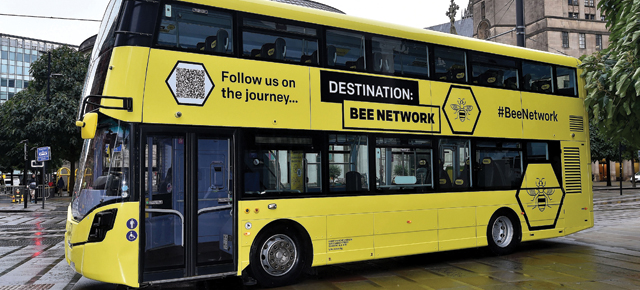Vernon Everitt, Greater Manchester’s Transport Commissioner, believes that the Bee Network will transform the city region’s transport system
Everitt: ‘Bee Network about delivering growth’
Vernon Everitt, Greater Manchester’s transport commissioner, told Transport Focus board members last week that the region was on the cusp of “something genuinely transformational” as it moved to begin rolling out the fully integrated Bee Network.
He said the entire network had been designed to optimise economic productivity while ensuring Greater Manchester became an inclusive place to live and work.
“It’s bringing together buses, Metrolink, the active travel side of things and, ultimately, local rail into one system,” Everitt explained. “It’s not here to absolutely replicate what happens in London, but some of the core elements that have made London a successful public transport operation are applicable here. Integration is at the heart of it, including integrated ticketing and information alongside those rock solid, high quality safe, affordable, reliable day-to-day services.”
He said that improving public transport in Greater Manchester would enable “other stuff”.
The Bee Network can deliver more jobs, more businesses, more homes and inclusion
“It’s not an end in itself,” Everitt added. “The Bee Network can deliver more jobs, more businesses, more homes and inclusion.” In addition, he said the Bee Network would deliver better sustainability for the region by giving people a better alternative to using their cars.
Everitt continued: “That’s not an anti-car statement. There are lots of car journeys that are absolutely essential, but at the moment [they account for] over two-thirds of the journeys in this region… we want to offer them a decent, affordable, reliable alternative to their vehicle. That’s what makes me extremely optimistic about patronage.”
He said he felt there was a massive market for Greater Manchester to go after with the Bee Network, much of which will be fuelled by the population growth the region has been experiencing in recent years.
If you go around the 10 districts, there’s building, there are commercial developments, there are housing developments. Everyone needs to be able to move around sustainably and we believe integrated public transport is the answer
“If you look at Salford and the centre of Manchester, there are cranes everywhere,” Everitt said. “If you go around the 10 districts, there’s building, there are commercial developments, there are housing developments. Everyone needs to be able to move around sustainably and we believe integrated public transport is the answer.”
He pointed to the current modal split between the car and sustainable transport. This is currently 60% in favour of the car and the first step to building patronage was to get that closer to a 50:50 split. Everitt said this equates to around one and a half million journeys each day being moved to public transport.
He continued: “We want to go much further than that and we want to go faster. We believe the plans that we’ve got in hand will enable us to do that.”
Everitt described the Bee Network as being rather similar to London Overground and its creation in 2007. He said creating the brand had allowed Transport for London to link up disparate parts of the capital’s rail network, enabling members of the public to envisage how they could make journeys by public transport in a way they couldn’t see before.
“It wasn’t evident as a network until it was painted orange,” he claimed. “We could demonstrate to people a new way of moving around.”
Everitt also highlighted how the introduction of the £2 bus fare cap last autumn had allowed Greater Manchester to tackle unaffordable bus fares and that it was already starting to drive growth. Between September and December, bus patronage had risen by around 10% and he felt that around half of that growth had been driven by the fares intervention.
“It just goes to show that if you can price things properly – and make things simpler – they’ll use you more,” Everitt added.
I don’t know any bus network in the country that completely washes its face. It certainly doesn’t in London
But he admitted there would always be a requirement for public money to support the network. “There will always be some requirement for governments to provide support,” Everitt said. “I don’t know any bus network in the country that completely washes its face. It certainly doesn’t in London – pre-Covid the surplus on the Tube used to plug the gap in bus subsidy. We will continue to need support but we recognise we need to raise money locally. There’s lots of money going into this which has been raised here.”
When probed further on the finances of Greater Manchester’s plans by board member Arthur Leathley, Everitt returned to growth and claimed there was a “massive revenue upside opportunity”. He pointed to Metrolink where patronage was already ahead of 2019’s figures in the midweek and at weekends.
“We’re edging towards 90% overall,” he said. “In London the Tube is at about 85%… The challenge [for them] is that lots of people [in London] can work from home. It’s not the same here. Many people have to be in work, so there’s a huge commuter market and a huge leisure market here [for us to go after].”
This story appears in the latest issue of Passenger Transport.
DON’T MISS OUT – GET YOUR COPY! – click here to subscribe!
The post Everitt: Bee Network will transform GM first appeared on Passenger Transport.

